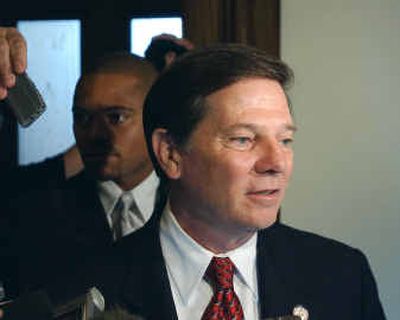Ethics committee says DeLay improperly tried to sway vote

WASHINGTON – The House Ethics Committee on Thursday said that majority leader Tom DeLay, R-Texas, behaved improperly nearly a year ago when he tried to convince Rep. Nick Smith, R-Mich., to change his vote on the Medicare prescription drug benefit bill.
In a statement, the committee said it unanimously approved the report by a subcommittee charged with investigating Smith’s allegations that he had been offered bribes and threats to change his vote from “no” to “yes.” The 72-page report of the subcommittee offered a “public admonishment” of both DeLay and Rep. Candice Miller, R-Mich.
The admonishment is an embarrassment for DeLay and the House Republican leadership – whom Democrats accused of unfairly keeping the vote on the Medicare bill open for hours and of going beyond routine political arm-twisting in an effort to change “no” to “yes” votes in the pre-dawn hours of Nov. 22, 2003.
The bill passed by five votes and was signed into law in December. Republicans have hailed it as the first major expansion of Medicare benefits in decades.
DeLay could not be reached for comment on the committee’s findings. But the report noted that in his testimony to the subcommittee, he said that he did not believe he had acted improperly under House rules in pressing Smith to change his vote.
In interviews and a column he wrote after the vote, Smith – who has since retired from the House – charged that lawmakers and businessmen had promised him money for his son’s congressional campaign if he would switch his vote; Smith also said that they had vowed to harm his son’s political career if he did not change his vote.
Smith’s son, Brad Smith, finished second in a six-candidate primary.
Initially, Nick Smith said that he was offered $100,000 for his vote. He later partially retracted that statement, telling the Associated Press that someone outside Congress had offered his son “substantial and aggressive campaign support,” which Smith assumed meant money.
The committee also admonished Smith, saying he had refused to cooperate fully with its investigation and had improperly accused members of trying to bribe him.
“No group, organization, business interest or corporation of any kind, or any individual affiliated with any such entities, offered $100,000 or any other specific sum of money to support the congressional candidacy of Brad Smith in order to induce Rep. Nick Smith to vote in favor of the Medicare Prescription Drug Act,” the subcommittee said in its report.
Neither was there evidence “that any consideration or discussion of an endorsement was undertaken within the National Republican Congressional Committee,” the report said.
But the subcommittee, in an exhaustive account of the Republican leadership’s frantic effort to round up votes for the Medicare bill, offered a rare glimpse into the rough-and-tumble nature of political horse-trading that it said had gone beyond acceptable boundaries.
The report found that on Nov. 21, 2003, “DeLay offered to endorse Rep. Smith’s son in exchange for Rep. Smith’s vote in favor of the Medicare bill.”
In its report, the subcommittee said that the evidence “could support a finding that Majority Leader DeLay violated the House rules,” and concluded “that it is improper for a member to offer or link support for the personal interests of another member as part of a quid pro quo to achieve a legislative goal.”
The committee said Smith had testified that DeLay approached him on the House floor during a series of roll call votes and said: “I will personally endorse your son. That’s my last offer.” The committee noted that Smith wrote in his diary calendar that he “teared up” in response to DeLay’s statement.
The report goes on to quote Smith as saying that after the final vote on the bill, he felt “beat … tired, physically and mentally. And angry, as you might guess.”
The report noted that “the issues raised by the conduct of the Majority Leader in this matter are novel in that conduct of this nature and the implications of such conduct have never before been addressed or resolved by the Committee on Standards of Official Conduct,” the formal name for the ethics committee.
The report found that Miller had made “a specific and unprovoked threat of retaliation against Rep. Smith because of his vote in opposition to the Medicare Prescription Drug Act,” and concluded that her remarks, made to Smith on the House floor as the vote was under way, were “improper.” But it did not recommend further action against DeLay or Miller.